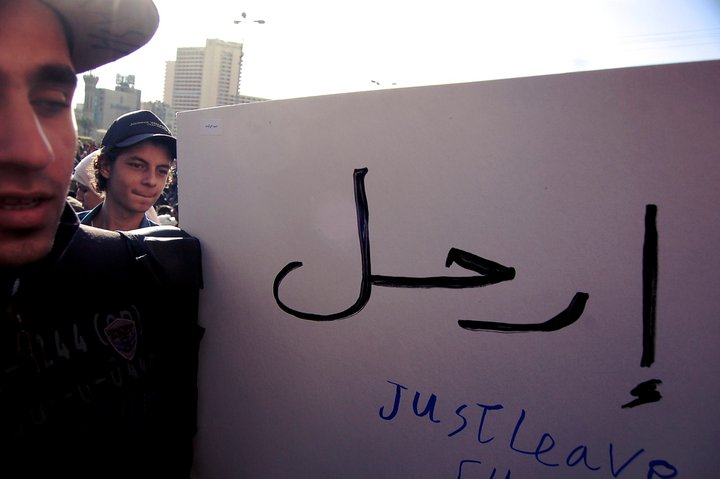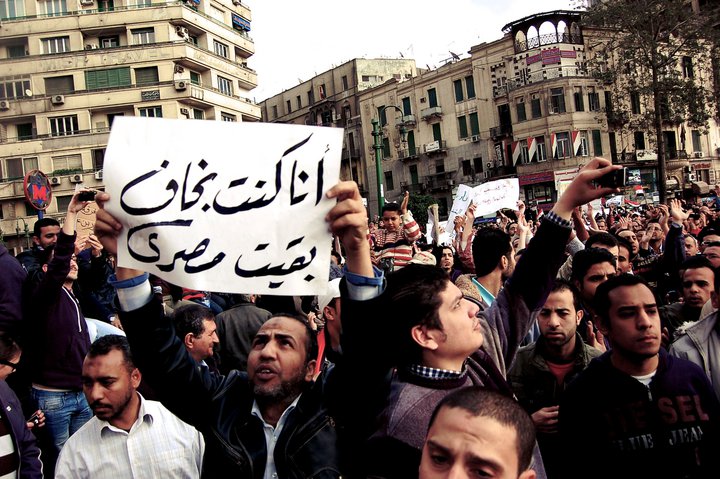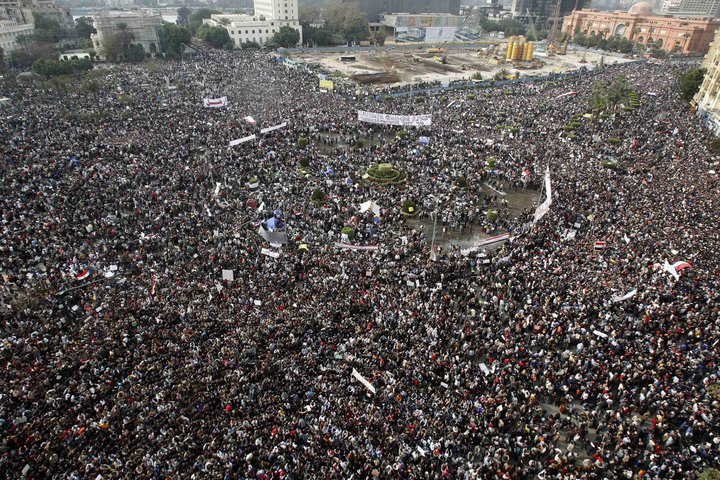"ارحل" ("Leave")
[1 pm Cairo time; 6 am Washington DC]
If Ariel Sharon wakes up from his coma and hears the full spectrum of protesters and slogans in Tahrir Square and throughout all corners of Egypt now, he would support the departure of Husni Mubarak.
One must watch the footage of Tahrir Square and elsewhere in Egypt now (1pm, Cairo time).
One must listen to the chants, all of them.
One must watch the decorum of the protesters.
One must note the palpable resolve and the infinite stories it tells.
Those of us fortunate enough to have known the songs being sung and breathed and exhaled in Tahrir will be moved further, viscerally. These songs and hymns (see Sinan and Elliot’s take on the poetry and songs of revolt here on Jadaliyya) speak to a message that we always knew was part of a collective desire for an alternative to the existing order.

["Leave"]
Anyone interested in learning what is happening in Egypt would do well to pay attention to the nature, kind, and content of the protests taking place at this moment—not just in Cairo or Tahrir, but throughout Egypt, almost uniformly. Even in the absence of full communication and despite the violent intimidation protesters and potential protesters were subjected to in the past days, the uniformity and decency (as in, soundness and level-headedness) of the message is unmistakable: “Leave.” “ارحل”
The convergence of protesters throughout Egypt today despite all odds sends a message to the regime, to Arab regimes, and to the world, a message that was uttered by one of the protesters a couple of hours ago in Tahrir: [paraphrasing] “we do not need anyone to support us. We will save ourselves”
(“يحنا مش عاوزين حد. احنا حننقذ نفسنا”)

["I used to be afraid, now i`m Egyptian"]
Make no mistake, this is no longer a short term game or uprising. The short-term game (akin to that of the Tunisian revolt) was abrogated this week when it was evident the President is recalcitrant about staying in power for now. As with several similar instances of uprising and revolt, three of the indicators of its depth and breadth are its staying power, scope, and geographic ubiquity. So far, many of us, including Egypt “experts” (the good kind, not the “security” kind who are experts on everything from Mubarak to Maqlubeh), have been humbled by the staying power of these protests, the range of issues that brought people to the streets and that were brought up while on the streets, and the spread of the protests throughout all provinces of Egypt.

[Tahrir Square]
The protesters have affirmed that they will not leave until he (Mubarak) leaves. Their resolve is further fortified, so far, by the near-absence of the thugs and security service men who wreaked havoc in the past few days. Protests in Cairo, Alexandria, Aswan, Suez, `Arish, Uqsur, Tanta, Isma`eeliyya, Asyout, Damanhour, Mansoura, and elsewhere continue to increase in number, with very little obstruction or disruption by the powers that be, a sign of resignation, even if temporary, that they can no longer forward the empty claims about the nature of the protests and how they are “infiltrated” or illegitimate. Still, only Egyptian television is broadcasting nonsense that the numbers have decreased in Tahrir (right when the numbers exploded after 1pm), causing protesters to circulate the slogan: “الكذب حصري على التلفزيون المصري” (“lying is confined to the Egyptian television”). It rhymes nicely in Arabic. Even mainstream US media is finding it difficult to continue the infantile blabber of a week ago related to Jihadists and Islamists taking over and varieties of this phobia. Thanks to Anderson Cooper who got beat up by Mubarak thugs—along with many other journalists from across the globe who were beaten or harassed so they would be shoed away from this Friday’s protests—coverage is actually becoming less horrendous (Read Lisa’s supert Anderson Cooper’s Effect here). It is notable that the pro-Mubarak forces in Egypt, including member of the NDP interviewed on Television, assert that the reason there are no "pro-Mubarak" protests because they did not want trouble. Hmm. So, there`s an inverse correlation between desire for trouble and numbers of protesters (when the number of protesters was lower the evening of Wednesday, the desire for trouble was high).

[Normally, I do not see the benefit of asserting this point/slogan, but the anti-sectarian sentiment among the protesters has been quite remarkable]
I would like to write more at this point because there are various dimensions that can be discussed and illuminated. Somehow, this does not seem to be the time for analysis. As the number of protesters continue to increase and reveal the increased national consensus on the removal of Mubarak (approaching a million around Tahrir, and surpassing the numbers of previous days), it would be good to try to absorb it viscerally for a minute.
[This post will be updated throughout the day should matters develop]
If you are itching for analysis, here’s more on the situation on Egypt from Jadaliyya contributors:
• Encouraging the Outcome through Silence
• 9 am in Cairo after a Hellish Night: A Brief Report of Cautious Triumph
• The "Anderson Cooper Effect" on American TV Reporting from Cairo (Updated Feb 3)
• Into Egypt`s Uncharted Territory
• Egypt on the Brink: The Arab World at a Tipping Point?
• Egypt and the Future of the Corporate Grid
• Open Letter to President Obama in Support of the Egyptian People
• Omar Suleiman, the CIA`s Man in Cairo and Egypt`s Torturer-in-Chief
• Egypt Now: Moving to the Next Level as Protests Continue (Updated)
And, well,
• Let`s Not Forget About Tunisia
• Saudi Arabia`s Silent Protests
• Jordan: The Limits of Comparison
